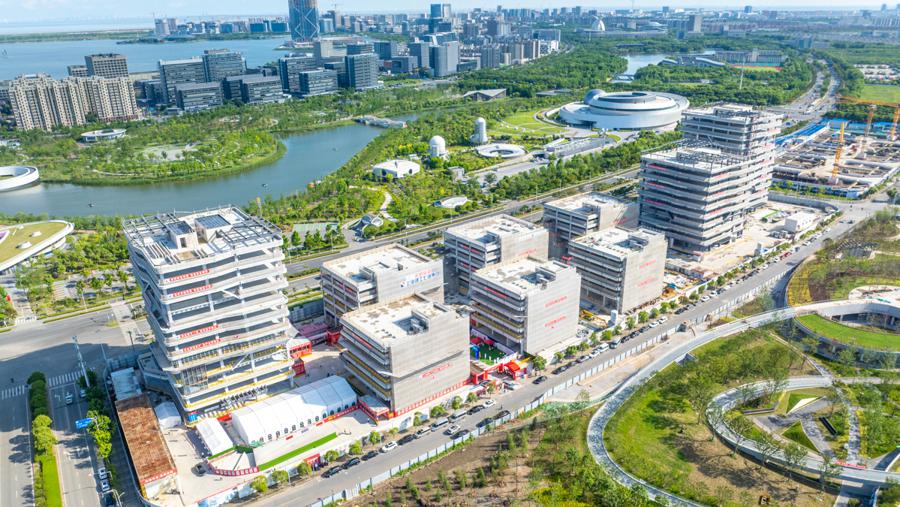Free trade zones incubators for nationwide policies


Since the 18th National Congress of the Communist Party of China in 2012, the CPC Central Committee with Comrade Xi Jinping at its core has been committed to forging a new pattern of comprehensive opening-up, leveraging institutional opening-up as the guiding force to align with international norms and advance high-standard opening-up.
As the legal expression of China's comprehensive opening-up policy, institutional opening-up underscores the guiding and safeguarding role of the rule of law, which has become a critical element in advancing high-standard openness.
The Recommendations of the Central Committee of the CPC for Formulating the 15th Five-Year Plan (2026-30) for National Economic and Social Development, adopted at the fourth plenary session of the 20th Central Committee of the CPC, further emphasize the need to expand opening-up at the institutional level, safeguard the multilateral trading system, promote broader international economic flows, and use opening-up to drive reform and development.
Under the guidance of the national policy, China's pilot free trade zones have been entrusted with the mission of serving as key testing grounds for leading domestic reforms and pioneering demonstration zones for promoting high-standard opening-up.
During the 10th group study session of the Political Bureau of the CPC Central Committee in November 2023, Xi pointed out that China must align with international advanced standards and elevate effective measures and experiences from high-level opening-up initiatives, such as the FTZs, into laws in a timely manner.
The guidelines have charted the course for the development of a legal framework for FTZs. Through pilot testing, they provide practical models and innovative impetus for refining national laws and regulations.
Since the establishment of the Shanghai FTZ in 2013, the central government has uniformly deployed the FTZ layout, setting up 22 such FTZs across the country. The core mission of these FTZs is to leverage policy and institutional innovations to align with high-standard international economic and trade rules, conducting stress tests and institutional explorations.
The strategy of upgrading pilot free trade zones outlined in the recommendations clarifies the demonstrative role of FTZs in aligning with international rules and expanding autonomous openness. This role is directly reflected in their core mechanism of pilot testing and replication-promotion.
For example, the Shanghai FTZ in July is designated to promote its experiences in 77 measures such as for institutional opening-up and identified its successful experiences in areas such as digital trade and intellectual property protection as replicable and promotable pilot measures, to be disseminated nationwide at different levels.
China's FTZs have significantly advanced the country's rule of law through three key mechanisms. First, central authorization enables local legislative experimentation. In 2013, the Standing Committee of the National People's Congress authorized the State Council to temporarily suspend certain provisions relating to administrative approval in China's three foreign investment laws in the Shanghai FTZ. This model was later extended to FTZs in Guangdong and Tianjin to liberalize investment controls.
Second, FTZs focus on legal system innovation to address core challenges in market economy reform. Under central authorization, they create new rules in areas where national laws are temporarily suspended, with innovations in rulemaking, regulatory models, and operational mechanisms targeting fundamental difficulties in reform.
Third, FTZs emphasize replicable legal models for national legislation. Though locally based, FTZs serve the national strategy by developing transferable reform experiences. The "pre-establishment national treatment plus negative list" model of the Shanghai FTZ, tested through six years of practice, directly contributed to the Foreign Investment Law of the People's Republic of China in 2019, demonstrating the model's successful replication nationwide.
As testing grounds for reform and innovation, China's FTZs have consistently worked to align with international economic and trade rules and advance institutional opening-up. This provides a platform for exploring the integration of international norms with domestic legal frameworks.
Currently, FTZs are undergoing a significant transformation from being "policy lowlands" to "rule highlands". Compared to traditional international rules, high-standard frameworks such as Regional Comprehensive Economic Partnership, Digital Economy Partnership Agreement, and Comprehensive and Progressive Agreement for Trans-Pacific Partnership feature deeper commitments, broader coverage and stronger enforcement mechanisms.
China's strategy on FTZs involves using these higher-standard rules as benchmarks to drive deeper institutional reforms through systematic opening-up. These regulations emphasize systematic integration and holistic design, directly aligning with the high-standard agreements of the CPTPP. This shifts the focus of institutional innovation to cover domestic regulatory areas such as environmental protection, labor standards and digital trade.
As institutional innovation in the FTZs deepens, China's influence in shaping international economic and trade rules is steadily growing. From initial alignment in specific sectors to comprehensive systemic innovation, the FTZs are becoming a crucial engine driving China's institutional opening-up.
China's FTZs have not only advanced the modernization of China's domestic legal system through authorized legislation, regulatory innovation and replication of successful practices but have also facilitated the integration of international standards with local practices. This dual role provides robust institutional support for China's deeper integration into the global economic system.
The author is the president of the Shanghai University of Political Science and Law.
The views don't necessarily reflect those of China Daily.
If you have a specific expertise, or would like to share your thought about our stories, then send us your writings at opinion@chinadaily.com.cn, and comment@chinadaily.com.cn.


































